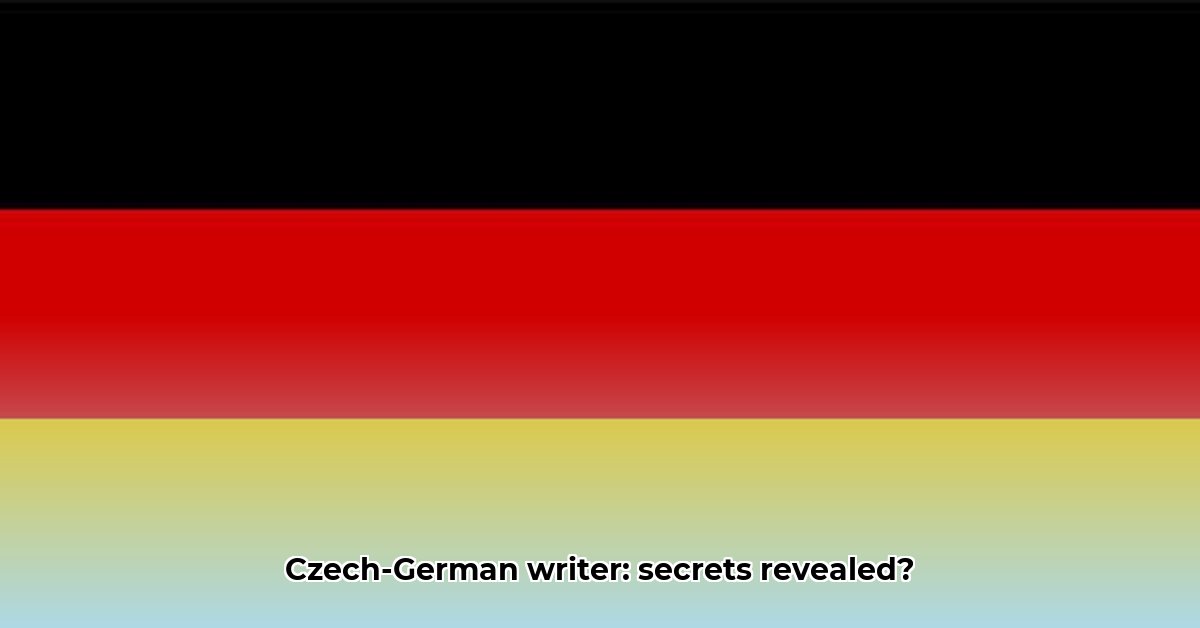
Tsjechisch Duitse Schrijver: Unearthing Literary Crossings
Is jy bekend met Tsjechisch Duitse Schrijvers? Probably not, and that's precisely why we're here. This article explores a fascinating, often overlooked corner of the literary world: authors who bridge the gap between Czech and German writing. It's like discovering a secret passageway between two vibrant literary landscapes. Let's uncover some hidden gems! This isn't about stuffy academic jargon; we'll explore key themes and provide practical tips for further research. We'll examine the historical context, highlight influential authors, and equip you to navigate this rich field of study.
Finding the Writers: It's a Treasure Hunt!
Where do we even begin this literary expedition? Imagine a vast library overflowing with books, but you're only interested in those written by Czech authors with significant connections to German culture, or even those who wrote in German. That's our quest! Starting with resources like Wikipedia's list of Czech authors is a good first step – but we need to be more precise. We're looking for authors who wrote in German, or whose work displays a strong German influence. Try online searches using phrases like "Czech authors, German language," or focus on specific periods of significant cultural exchange between the two countries. Did you know that the period after World War II saw particularly complex exchanges?
Quantifiable Fact: A significant number of Czech authors emigrated after the war, many finding refuge in Germany, significantly influencing the literary landscape of both nations.
Beyond the Names: Delving Deeper
Finding names is just the beginning. We need to understand why these writers are unique. What are their narratives about? How did their Czech heritage and German connection shape their work? It's like assembling a complex puzzle – each author is a piece, and together, they form a larger picture.
To truly grasp their significance, we must delve into their lives, analyse their writing styles, and identify recurring themes. This involves exploring university databases, reading scholarly articles, and perhaps even visiting specialized libraries with archives of Czech and German literature. Think about the impact of historical events – how did the rise and fall of the Austro-Hungarian Empire, for example, shape their creative output?
Rhetorical Question: How can we ensure that the unique voices of these Czech-German writers are not lost to history, but celebrated and understood?
Uncovering Common Threads: Patterns in the Puzzle
Once we've identified several Tsjechisch Duitse Schrijvers, let's look for common ground. What connects them? Did they share similar experiences? Did they write about similar themes? Did they explore cultural tensions, or perhaps focus on specific historical events? Identifying these patterns helps us see the larger context of this fascinating literary intersection. One striking aspect could be the exploration of identity and belonging in a context of multiple cultural influences.
Building a Resource: For Everyone!
Our ultimate goal isn't just a list of names but a valuable resource: a comprehensive bibliography, a detailed annotated list, or even a collection of translated excerpts. The aim is to make this area of literature more accessible to everyone, from seasoned scholars to curious individuals. This is a crucial step to preserving and promoting these often overlooked contributions to world literature.
Future Research: What's Next?
To push the boundaries of our understanding, consider these avenues:
- Create a comprehensive database: A detailed list of Tsjechisch Duitse Schrijvers, including biographical information and details of their most significant works.
- Analyze recurring themes: Identify common threads about writing style and cultural influences in their works.
- Prioritize translation: Much of this work may not be accessible in English. Identifying works deserving translation is crucial for wider dissemination.
- Leverage digital tools: A website or online resource would expand access to this invaluable information.
The Big Picture: Expanding Our Literary World
This isn't simply an academic exercise; it's about broadening our appreciation of the immense diversity within literature. It reveals the profound influence of cultural exchange on artistic expression. Discovering even one overlooked masterpiece is a triumph – a testament to the power of stories that transcend borders and enrich our lives. Let's begin our exploration – a world of stories awaits discovery.
Remember, this is an ongoing process. Our understanding will evolve as more information emerges. There is much to uncover, presenting exciting opportunities for future research.